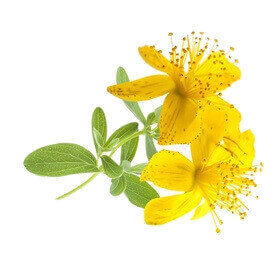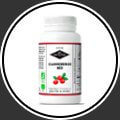Main properties and uses of St. John's wort
The 100% natural anti-depressant!!! St. John's Wort is the medicinal plant most used in the world to combat mild and moderate depression. Indeed, St. John's Wort would provide the same effects as a "classic" antidepressant but without the disadvantages and side effects generally associated with chemical molecules. Its mode of action is similar to that of conventional antidepressants and its effectiveness is remarkable for both classic depression and seasonal depression as well as the states that result from it: anxiety, stress or insomnia.
Main uses of St. John's wort:
- Mild depressive states:

- Moderate depressive states:

- Seasonal depression:

- Anxiety :

- Stress :

- Nervous agitation:

- Insomnia:

Secondary Uses of St. John’s Wort:
- Lack of energy :

- Obsessive compulsive disorders:

- Muscle pain such as cramps or neuralgia:

- Symptoms of menopause and premenstrual syndrome: hot flashes, palpitations, dizziness, etc.:

Different forms of use of St. John's Wort:
St. John's Wort can be consumed in different forms:
- Although the capsule remains the most practical form, St. John's Wort is available in other forms
- Tincture: for internal use in a glass of water
- Herbal tea and decoction: boil water and let the St. John's wort sachet infuse for a few minutes
- Oil: for external use (be careful, oil can stain clothes)

St. John's Wort Identity Card
- Nom botanique :
Hypericum perforatum - Synonyms:
herb of saint jean, grass of a thousand holes
- Family :
hyperiaceae - Part used:
flowering top
- Harvest time:
may June July - Geographic origin :
France, Poland, Spain
-
St. John’s wort as an antidepressant:
St. John's wort contains a very large number of active compounds; it is currently one of the most studied plants in the scientific literature. Among the many molecules identified, we mainly find hyperforin which is currently the main molecule responsible for the antidepressant effect of St. John's wort. Although its modes of action are multiple, St. John's wort acts above all at the level of the neuronal synapse in a manner analogous to medicinal antidepressants (synapse: space between two neurons, where information circulates thanks to the release of neurotransmitters by one of the neurons and the binding of this neurotransmitter to a receptor on the surface of the other neuron). It would inhibit the reuptake within the synapse of certain neurotransmitters, such as dopamine, serotonin and noradrenaline which are the neurotransmitters involved in mood modulation. Dopamine and serotonin, sometimes called good mood neurotransmitters, are sometimes present in too low quantities in depressed people. The principle of most current antidepressants (called SSRI: selective serotonin recapture inhibitor) and St. John's Wort is to inhibit the recapture of these neurotransmitters by the neuron that released them. These then stay longer in the synapse, so they have more time to activate their receptors on the surface of the other neuron. It is therefore a way of artificially increasing the quantity and effect of these neurotransmitters which are too few in number in depressed people. Commission E recognizes the traditional use of St. John's Wort for the treatment of certain psychosomatic disorders, depression, stress and nervous agitation.The World Health Organization recognizes St. John's Wort for the treatment of mild to moderate depression.
-
Other properties of St. John's wort:
St. John's wort would not only correct the depressive tendency. It is also known to have analgesic, anti-inflammatory, antioxidant and sedative properties. St. John's Wort can then be very useful in the event of sleep problems (falling asleep or waking up multiple times during the night).

The most interesting synergies based on St. John's wort
It may be interesting, to potentiate the effects of St. John's Wort, to combine it with other plants or essential oils. Here are some ideas depending on the pathology to be treated:-
For low morale and mild depression:

Plants: rhizome of Rhodiola (anti-stress, anti-fatigue, adaptogenic), valerian root (reduces nervousness and agitation linked to stress, sedative), female inflorescence of hops (sedative, relaxing), stigma of the crocus also called saffron (antidepressant natural)
Essential oils: lemon verbena (antidepressant) Ylang-Ylang (antidepressant)
Other assets: no specific recommendation -
Against emotionality and nervousness:

Plants: poppy petal (sedative, reduces anxiety and emotionality)
Essential oils: Mandarin (relaxing, sedative, light hypnotic), Marjoram (nervous rebalancing, sedative)
Other assets: no specific recommendation -
Against anxiety and stress:

Plants: the flowering top of hawthorn (hypotensive and regulates heart rate), the rhizome of rhodiola and valerian root (reduces nervousness and agitation linked to stress, sedative)
Essential oils: Noble chamomile (sedative), true lavender (calming, sedative, antidepressant)
Other assets: no specific recommendation
Precautions for use and contraindications of St. John's Wort:
This information is not exhaustive!! Always also consult the instructions on the product packaging as well as the manufacturer's recommendations. If in doubt, consult a health professional.
When St. John's Wort is consumed in recommended doses, its side effects are rare and generally mild. As for its toxicity, it is almost non-existent.
Attention !! St. John's Wort is contraindicated in people with fertility problems, attention deficit hyperactivity disorder (ADHD), significant depression, schizophrenia or Alzheimer's disease.
- Keep out of reach of young children.
- Not recommended for pregnant or breastfeeding women.
- Use reserved for adults.
- This product cannot replace a varied diet and a healthy lifestyle.
- Do not exceed the recommended daily dose.
Some additional tips!
If you are on synthetic antidepressant and want to switch to St. John's Wort
St. John's Wort can, as already mentioned above, interact with certain allopathic medications such as antidepressants. It is therefore necessary, ideally, to gradually reduce the classic antidepressant and gradually increase the St. John's Wort. Suddenly stopping a classic antidepressant is completely contraindicated. To ensure this transition goes smoothly, your doctor is best placed to advise you. It must also be emphasized that for excessively severe depression, a classic antidepressant remains strongly recommended. Self-medication is never recommended.
If you wish to stop treatment with St. John's Wort
St. John's Wort, although completely natural, has a mode of action similar to classic antidepressants. It is therefore advisable, as with a classic antidepressant, to reduce the doses gradually. To do this, ask your doctor for advice.
Interactions to consider with St. John’s Wort:
Drug Interactions:
St. John's Wort is an enzyme inducer of cytochrome P450. This cytochrome is an enzymatic system located in the liver which is involved in the metabolism (i.e. the destruction or on the contrary the activation) of many drugs. Medications taken orally all pass, before arriving at their site of action, through the liver where they undergo what is called a “hepatic first pass effect”. This means that during their passage through the liver, part of the ingested dose is either destroyed or activated and metabolized into active drug. This first-pass hepatic effect is always taken into account in scientific notices to determine the dosage of a drug. By activating these cytochromes P450, St. John's Wort can therefore reduce or increase the quantity of many treatments taken orally. Their effectiveness will therefore be modified.
Except in special cases, we can generalize that by activating a cytochrome we increase the destruction of most of the molecules metabolized by this cytochrome: St. John's wort therefore reduces the effectiveness of many treatments. For information, here is a non-exhaustive list of medications presenting risks of interactions:
*** Tricyclic antidepressants, selective serotonin reuptake inhibitors (SSRIs) or monoamine oxidase inhibitors (MAOIs)
*** Benzodiazepine-type anxiolytics (e.g.: Xanax)
*** Anesthetics
*** Antiretroviral drugs used in cases of AIDS (HIV)
*** Cyclosporine (an anti-rejection drug used for organ transplants)
*** Digoxin-type cardiac glycosides and others used in heart disease
*** Someoral anticoagulants
*** Oral contraceptives (pills)
*** Statins used in the treatment of cholesterol
*** Certain chemotherapy agents
*** Certain antipsychotics
*** Certain antidiabetics
*** Certain sedatives used to facilitate sleep
*** Certain painkillers
*** Certain anti-migraine medications
Our recommendation is to NEVER consume St. John's Wort WITHOUT consulting your doctor, if you are already taking other medications.
It is important to note that many conventional drugs also act on these cytochromes, activating or inhibiting them to varying degrees. St. John's Wort is one of the only herbal medicine supplements to have this type of interaction. It is nonetheless an excellent treatment but caution is advised if you are taking other medications.

Mild to moderate depression:
Numerous studies have demonstrated that St. John's Wort (especially the standardized extract) is more effective than placebo and just as effective as the conventional antidepressants against which it has been tested: SSRIs such as fluoxetine, sertraline, paroxetine or citalopram (considered new antidepressants) as well as an older molecule such as imipramine. It would also cause fewer side effects.
Bibliography of this study: Linde K, Berner MM, Kriston L, St. John's Wort for Major Depression, 2008
Rahimi R, Nikfar S, Abdollahi M, Efficacy and tolerability of Hypericum Perforatum in major depressive disorder compared with selective serotonin reuptake inhibitors: a meta-analysis, 2009
Conclusion and professional opinion:
St. John's Wort has a real beneficial effect on insomnia, depression and anxiety (mild to moderate). It can therefore be widely considered as an excellent 100% natural antidepressant, especially since it has the great advantage of not causing any addiction. However, presenting a high risk of interactions with other plants, food supplements or medications, it is strongly recommended to consult a doctor before undertaking treatment with this plant if you are already on medication.
The data summarized here is given for information purposes and cannot engage our responsibility.
For further information on use, instructions for use, precautions to take and uses advised against, please refer to the commercial data sheet and label of your products. The food supplements described here are natural plant-based products. However, they are not without danger and without possible interactions with other medications or treatments. It is therefore very important to respect the recommended doses and to tell your doctor or pharmacist that you are taking these products: only he or she will be able to determine if any interactions exist between the food supplement and another treatment or medication that you may be taking.
The pathologies cited in this article are illnesses that can be serious or even life-threatening. A visit to a doctor remains essential. Only he will be able to make a precise diagnosis and, if necessary, provide you with the most appropriate treatment.
Bibliography
- Sophie L, My herbal medicine bible. Ed leduc. S 2017
- Lousse D, Macé N, Saint-Béat C, Tariff A, The family guide to medicinal plants. Ed Mango 2017
- Summary of phytotherapy. Ed Alpen
- Lakhan SE, Vieira KF, Nutritional and herbal supplements for anxiety and anxiety-related disorders: a systematic review, 2010
- Linde K, Berner MM, Kriston L, St. John's Wort for Major Depression, 2008
- Rahimi R, Nikfar S, Abdollahi M, Efficacy and tolerability of Hypericum Perforatum in major depressive disorder compared with selective serotonin reuptake inhibitors: a meta-analysis, 2009
- Barnes Joan, Anderson A Linda, Phillipson David J. Herbal Medicines, Pharmaceutical Press, Great Britain, 2007, 3rd edition.
- Da-Jung Chung, Hue-Yeon Kim, Ki-Hyun Park, Kyung-Ah Jeong, Sung-Ki Lee, Joo Hyun, Black cohosh and strong climacteric symptoms of St. John's wort, 2007
NOTE: This article was written by a pharmacist. The data summarized there come from the scientific literature and the references cited above. For medical advice, in the event of specific or prolonged symptoms, please consult your doctor. Only he will be able to make a precise diagnosis and provide you, if necessary, with the most appropriate treatment.
 OUR
OUR